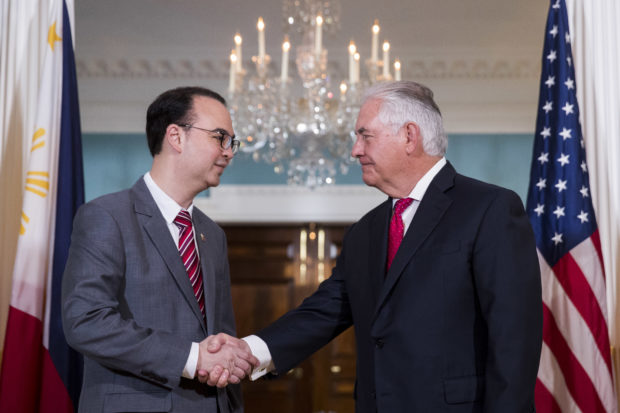39 countries urge PH to end drug killings

Foreign Secretary Alan Peter Cayetano with US Secretary of State Rex Tillerson in Washington: “Biased and based on questionable information.” —AP
The United States, Canada and Australia, three of the Philippines’ major trading partners and political allies, have joined 36 other nations in mounting international pressure on Manila to end the killings and the growing culture of impunity in President Duterte’s brutal antinarcotics campaign.
In a move that could rile the President, the 39 countries signed a joint statement calling on the Duterte administration to uphold the “universal principles of democratic accountability and the rule of law” in resolving the thousands of killings in his war on drugs.
More than 3,800 people have been killed by the police in antidrug operations since last year. Thousands of others were killed by unknown assailants suspected to be working with the authorities.
Responding to the statement, presidential spokesperson Ernesto Abella said the government would be happy to accept foreign assistance in ridding the country of the “scourges of drugs, corruption and criminality,” but it would never allow other nations to dictate how it should handle its internal affairs.
In Washington, where he recently met US State Secretary Rex W. Tillerson, Foreign Secretary Alan Peter Cayetano said the joint statement was “biased and based on questionable information.”
Article continues after this advertisement“It is very unfortunate that instead of engaging us constructively, some western countries would rather criticize and impose conditions as if they can do a better job than the government in protecting the Filipino people,” Cayetano said.
Article continues after this advertisementThe Philippine Mission to the UN also assailed the statement, describing it as “sweeping and politicized.”
Pursue investigations
In their statement, which was delivered by Iceland at the 36th session of the United Nations Human Rights Council (UNHRC) in Geneva on Thursday, the 39 countries urged the government “to take all necessary measures to bring these killings to an end and cooperate with the international community to pursue appropriate investigations into these incidents.”
“We remain concerned about the thousands of killings and climate of impunity associated with the war on drugs, and note recent stated commitments to observe due process in investigating these crimes,” the statement said.
The 39 countries, which also included France, Germany, Norway and the United Kingdom, wanted the Duterte government to allow UN special rapporteur on extrajudicial killings, Agnes Callamard, to visit the Philippines without preconditions or limitations.
Mr. Duterte had repeatedly verbally attacked and cussed at Callamard for expressing her views on the country’s worsening human rights situation since he took office in June 2016.
Duty bound
The 39 countries reminded the Philippines that it was duty bound to observe the “highest standards in the promotion and protection of human rights” as a member of the UNHRC and called on Manila to investigate alleged human rights violations and “create a safe and secure environment for indigenous communities, journalists and HRDs (human rights defenders).”
In a speech he delivered in November last year, the President had threatened to kill human rights advocates critical of his take-no-prisoner strategy against the illegal drug trade.
He also warned he would order the bombing of lumad schools in Mindanao for allegedly teaching their students to “rebel against the government.”
Address violations
The joint statement expressed regrets that the government rejected 154 of 257 recommendations “necessary to address serious human rights violations,” which were presented during UNHRC’s Universal Periodic Review (UPR) of the country’s human rights situation this year.
Abella said the UNHRC “unanimously accepted and commended” the Outcome Report on the Philippines at the UPR, but lamented that “some parties refuse to understand certain aspects of our human rights efforts.”
The government is committed to protect its citizens from drugs, corruption and criminality, he said.
“To achieve these ends, we will always be happy to accept the help of our foreign friends. But we will never accept dictation on how we are managing our own internal domestic processes,” he said in a statement.
Culture of impunity
Abella denied that a culture of impunity exists in the Philippines, saying the country’s justice system “does not tolerate any state-sponsored extrajudicial killings.”
“So let us be clear. There is no culture of impunity in the Philippines,” Abella said.
He said all “credible allegations” of human rights violations were under investigation following the Constitution and the laws of the land and “in compliance with the spirit of our national traditions of liberty and democracy.”
He said claims of extrajudicial killings and alleged circumvention of police procedures should be proven in court. “Failing these, such claims are mere hearsay,” he said.
Maria Teresa Almojuela, deputy head of the Philippine mission in Geneva, criticized the mostly Western countries that signed the statement for instigating wars that have killed thousands.
“It is ironic that many states joining the statement are the very same states that are the sources of arms, bombs, machines and mercenaries that maim, kill and massacre thousands of people all over the world, not only during their colonial past, but even up to today,” she said.
Independent investigation
Human rights activists welcomed the joint statement and called for an independent investigation of the killings.
“The Philippines has so far shown itself unwilling to heed the calls to end this murderous campaign and hold those responsible to account,” John Fisher, Geneva director of the New York-based Human Rights Watch, said in a statement late on Thursday.
Fisher said the UNHRC body should intervene and exercise its authority “to end the violence, support an international investigation into the deaths and demand accountability for all unlawful killings.”
Ellecer Carlos, of the Philippine Alliance of Human Rights Advocates, said: “We appreciate the international solidarity against the deteriorating human rights situation in the Philippines, especially at a time when human rights defenders are vilified and threatened for the work that we do.” —WITH REPORTS FROM JHOANNA BALLARAN, NESTOR CORRALES AND THE WIRES